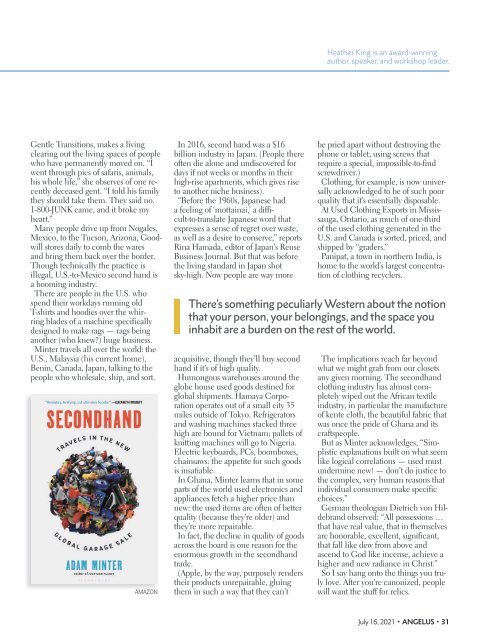Angelus News | July 16, 2021 | Vol. 6 No. 14
On the cover: A religious sister walks the grounds of St. Mary’s Abbey in Wrentham, Massachusetts. On Page 10, Ann Rodgers tells the story of a doctor’s fascination with his cloistered neighbors at the abbey, a collection of nearly forgotten tapes, and the providential strokes that have led to the Archdiocese of Los Angeles’ new “The Beauty Within” podcast project.
On the cover: A religious sister walks the grounds of St. Mary’s Abbey in Wrentham, Massachusetts. On Page 10, Ann Rodgers tells the story of a doctor’s fascination with his cloistered neighbors at the abbey, a collection of nearly forgotten tapes, and the providential strokes that have led to the Archdiocese of Los Angeles’ new “The Beauty Within” podcast project.
You also want an ePaper? Increase the reach of your titles
YUMPU automatically turns print PDFs into web optimized ePapers that Google loves.
Heather King is an award-winning<br />
author, speaker, and workshop leader.<br />
Gentle Transitions, makes a living<br />
clearing out the living spaces of people<br />
who have permanently moved on. “I<br />
went through pics of safaris, animals,<br />
his whole life,” she observes of one recently<br />
deceased gent. “I told his family<br />
they should take them. They said no.<br />
1-800-JUNK came, and it broke my<br />
heart.”<br />
Many people drive up from <strong>No</strong>gales,<br />
Mexico, to the Tucson, Arizona, Goodwill<br />
stores daily to comb the wares<br />
and bring them back over the border.<br />
Though technically the practice is<br />
illegal, U.S.-to-Mexico second hand is<br />
a booming industry.<br />
There are people in the U.S. who<br />
spend their workdays running old<br />
T-shirts and hoodies over the whirring<br />
blades of a machine specifically<br />
designed to make rags — rags being<br />
another (who knew?) huge business.<br />
Minter travels all over the world: the<br />
U.S., Malaysia (his current home),<br />
Benin, Canada, Japan, talking to the<br />
people who wholesale, ship, and sort.<br />
AMAZON<br />
In 20<strong>16</strong>, second hand was a $<strong>16</strong><br />
billion industry in Japan. (People there<br />
often die alone and undiscovered for<br />
days if not weeks or months in their<br />
high-rise apartments, which gives rise<br />
to another niche business).<br />
“Before the 1960s, Japanese had<br />
a feeling of ‘mottainai,’ a difficult-to-translate<br />
Japanese word that<br />
expresses a sense of regret over waste,<br />
as well as a desire to conserve,” reports<br />
Rina Hamada, editor of Japan’s Reuse<br />
Business Journal. But that was before<br />
the living standard in Japan shot<br />
sky-high. <strong>No</strong>w people are way more<br />
acquisitive, though they’ll buy second<br />
hand if it’s of high quality.<br />
Humongous warehouses around the<br />
globe house used goods destined for<br />
global shipments. Hamaya Corporation<br />
operates out of a small city 35<br />
miles outside of Tokyo. Refrigerators<br />
and washing machines stacked three<br />
high are bound for Vietnam; pallets of<br />
knitting machines will go to Nigeria.<br />
Electric keyboards, PCs, boomboxes,<br />
chainsaws: the appetite for such goods<br />
is insatiable.<br />
In Ghana, Minter learns that in some<br />
parts of the world used electronics and<br />
appliances fetch a higher price than<br />
new: the used items are often of better<br />
quality (because they’re older) and<br />
they’re more repairable.<br />
In fact, the decline in quality of goods<br />
across the board is one reason for the<br />
enormous growth in the secondhand<br />
trade.<br />
(Apple, by the way, purposely renders<br />
their products unrepairable, gluing<br />
them in such a way that they can’t<br />
be pried apart without destroying the<br />
phone or tablet; using screws that<br />
require a special, impossible-to-find<br />
screwdriver.)<br />
Clothing, for example, is now universally<br />
acknowledged to be of such poor<br />
quality that it’s essentially disposable.<br />
At Used Clothing Exports in Mississauga,<br />
Ontario, as much of one-third<br />
of the used clothing generated in the<br />
U.S. and Canada is sorted, priced, and<br />
shipped by “graders.”<br />
Panipat, a town in northern India, is<br />
home to the world’s largest concentration<br />
of clothing recyclers.<br />
There’s something peculiarly Western about the notion<br />
that your person, your belongings, and the space you<br />
inhabit are a burden on the rest of the world.<br />
The implications reach far beyond<br />
what we might grab from our closets<br />
any given morning. The secondhand<br />
clothing industry has almost completely<br />
wiped out the African textile<br />
industry, in particular the manufacture<br />
of kente cloth, the beautiful fabric that<br />
was once the pride of Ghana and its<br />
craftspeople.<br />
But as Minter acknowledges, “Simplistic<br />
explanations built on what seem<br />
like logical correlations — used must<br />
undermine new! — don’t do justice to<br />
the complex, very human reasons that<br />
individual consumers make specific<br />
choices.”<br />
German theologian Dietrich von Hildebrand<br />
observed: “All possessions …<br />
that have real value, that in themselves<br />
are honorable, excellent, significant,<br />
that fall like dew from above and<br />
ascend to God like incense, achieve a<br />
higher and new radiance in Christ.”<br />
So I say hang onto the things you truly<br />
love. After you’re canonized, people<br />
will want the stuff for relics.<br />
<strong>July</strong> <strong>16</strong>, <strong>2021</strong> • ANGELUS • 31


















